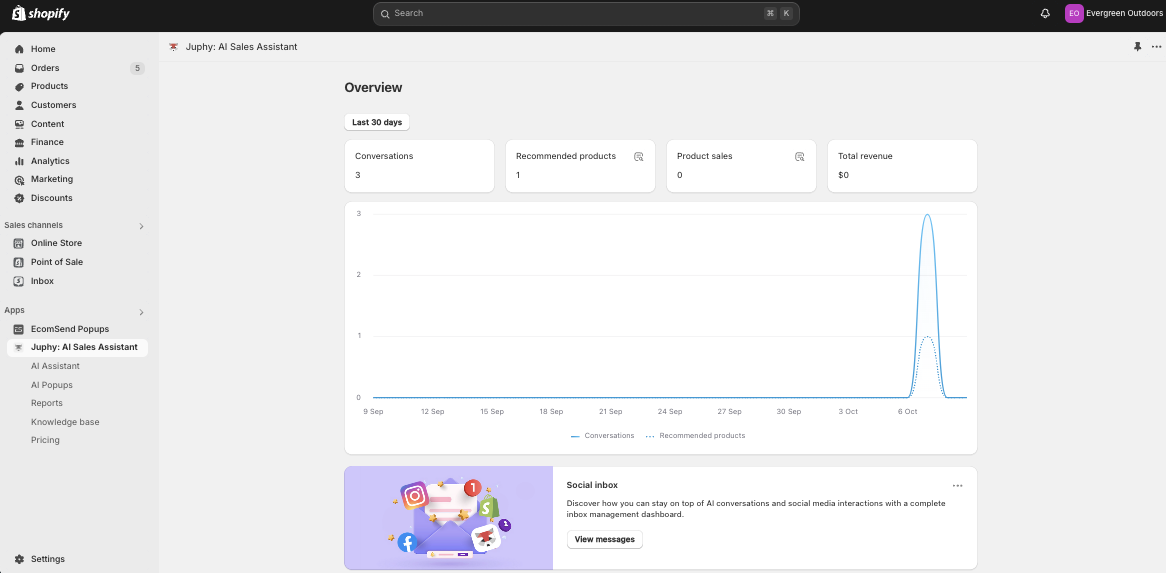Juphy’s Weekly E-Commerce News Express – 17-21 June 2024
Ceyda Duz
Welcome to this week’s e-commerce and AI news recap! From Salesforce’s latest holiday season predictions to Euromonitor International and the National Retail Federation’s deep dive into evolving retail trends, alongside new updates from Helio and Google and a partnership between Pinterest and Vtex, we’ve got everything you need to stay ahead in online shopping, AI, and retail trends. Dive in to catch up on the latest trends and updates shaping the future of e-commerce!

Salesforce’s Predictions for the 2024 Holiday Shopping Season
Salesforce has released insightful predictions about the upcoming holiday shopping season, which promise significant shifts in consumer behavior and retailer strategies. This year’s holiday shopping will be shaped by a combination of economic challenges, changing consumer preferences, and advanced technologies. Salesforce expects a challenging season for both shoppers and retailers, driven by various factors such as persistent inflation, supply chain issues, and an increased reliance on digital tools.

The company’s research indicates that consumers, having been resilient through years of economic uncertainty, are now feeling the pressure and seeking value more than ever. With these insights, Salesforce outlines key trends that are expected to define the 2024 holiday shopping season:
- The dominance of Chinese Shopping Apps: Salesforce expects 63% of Western consumers to use Chinese shopping apps like Aliexpress, Shein, and Temu due to competitive pricing. These apps are projected to capture 21% of holiday sales outside China.
- Rising Middle-Mile Shipping Costs: Brands and retailers are predicted to face a 97% increase in the middle- and last-mile shipping expenses. Despite these costs, offering free delivery remains important, as over half of shoppers prefer online purchases if delivery is free.
- AI in Holiday Shopping: AI will play a larger role, with 53% of shoppers interested in using generative AI for gift ideas. AI is expected to enhance search and conversion rates on retail websites significantly.
- Black Friday’s Digital Shift: E-commerce is set to capture 7% of in-store sales on Black Friday, with 72% of surveyed consumers preferring to shop online for convenience and free delivery.
- Leveraging Loyalty Programs: As digital marketing costs rise, retailers will have to focus on engaging existing customers through loyalty programs. Salesforce predicts that loyal shoppers will account for 40% of holiday purchases, emphasizing the importance of customer retention strategies.

These predictions highlight the evolution of holiday shopping, with a strong focus on pricing, AI integration, and customer loyalty. Retailers will need to adapt to these trends to effectively navigate the competitive and dynamic market environment of the 2024 holiday season.
Retail Reinvented: New Business Models, Channel Expansion, and Shopper Expectations
Retail is undergoing a significant transformation as new business models, channel expansion, and evolving shopper expectations reshape the industry. In partnership with the National Retail Federation, Euromonitor International has published a new report examining these changes and how they are redefining the path to purchase.

New Business Models
The rapid digitalization of retail has paved the way for innovative business models such as marketplaces, direct-to-consumer, and social commerce. Companies that are not traditionally in retail, including social media networks, streaming services, and gaming platforms, are now competing for shoppers’ attention and spending by integrating commerce capabilities. ByteDance, the owner of TikTok and Douyin, is an example of this change. In 2020, Douyin added commerce functionalities, and by Q1 2024, it became the largest online retailer in China for beauty and personal care products, with a 50% increase in online sales. This shift is altering industry norms, creating new partners and competitors, and operational changes as players seek additional revenue streams.
Channel Expansion
Retailers are moving from single-channel to omnichannel business models, creating multiple touchpoints to engage shoppers and drive growth. Combining these channels to provide a unified customer experience remains a challenge. The food sector illustrates these wider retail developments. While physical stores still dominate, accounting for 72% of global grocery sales in 2023, channels like discounters, warehouse clubs, food e-commerce, and on-the-go food services such as delivery, takeaway, and drive-through are gaining market share. Euromonitor predicts these trends will continue through 2028, driven by the value and convenience they offer.

Shopper Expectations
Today’s consumers expect more from their shopping experiences, demanding unique offers, personalized recommendations, exceptional service, easier checkouts, and faster delivery. Economic conditions, technological advancements, channel shifts, and personal values are all influencing these heightened expectations. The notion of values-based buying is increasingly becoming the center of consumers’ mindset. While finding bargains remains a top priority, its importance has declined by 16% over the past decade. Today, factors like quality, sustainability, convenience, and authenticity are vital in defining the value of a purchase.
As retailers and brands navigate new business models, channels, and shopper expectations, agility becomes essential. The rapid introduction of new technologies accelerates the rate of change, and retailers must balance competing trends such as price versus value to remain relevant. Euromonitor International identifies “Price vs Values” as one of the key tensions impacting the future of retail. Retailers and brands must address these points to support long-term strategic planning and stay competitive in an ever-evolving market.
Helio Upgrades Solana Pay Plugin for Shopify

Helio, a crypto payments provider, has enhanced its Solana Pay plugin for Shopify, enabling merchants to accept a variety of cryptocurrencies. This upgraded plugin supports multi-token payments, allowing buyers to make purchases using Solana or other cryptocurrencies, which are automatically swapped to stablecoins like USDC. This ensures merchants receive payments in a stable currency. Additionally, Solana Pay allows Shopify merchants to attract active crypto communities by enabling buyers to spend meme coins in their online stores.
Google Search Console’s E-Commerce Feature
Google has enhanced its Search Console with a new feature that allows merchants to track their Image Search product listings. This update provides e-commerce businesses with detailed data on impressions, clicks, and other key metrics related to their product showcases. The Performance report under the Google Search Image tab can access the new data. This addition offers businesses a more comprehensive view of their product visibility, helping them optimize their listings and improve their online presence.

Pinterest & Vtex Partnership

Pinterest has announced a partnership with Vtex, a composable commerce platform, to enhance the social commerce capabilities of large brands. This collaboration aims to help brands expand their social commerce footprint and connect more effectively with regional customers. Through Vtex’s platform, its 2,600 global brands can now integrate their product catalogs with Pinterest, create pins, and run performance shopping campaigns. This integration allows brands to leverage Pinterest’s extensive user base and visual discovery features to reach and engage potential customers more effectively, driving traffic and sales directly from the social media platform.
Juphy AI: Streamline Your Shopify Store with AI-Powered Efficiency
In the rapidly evolving retail and e-commerce landscape, leveraging AI technology is essential for advancing your business and staying competitive. Once you’ve implemented an innovative AI solution like a chatbot, managing and monitoring its interactions becomes crucial. Juphy’s AI Agent, powered by ChatGPT and tailored for Shopify stores, offers a seamless solution. With just a single click, you can connect Juphy AI to your Shopify store to effortlessly monitor every interaction through Juphy’s Unified Inbox.
Whether managing sales, providing customer support, or delivering personalized product recommendations, Juphy’s AI Agent unites all important information into one centralized hub. Every conversation detail is readily accessible, empowering you to ensure that every interaction aligns perfectly with your business objectives.
Take advantage of Juphy AI today and experience firsthand the ease and efficiency it brings to managing AI-driven customer interactions. Try Juphy AI now and start optimizing your retail operations: apps.shopify.com/juphy

Key Takeaways
Salesforce’s 2024 Holiday Season Predictions: Salesforce forecasts significant changes in holiday shopping, driven by economic challenges and advanced technologies. Trends include a rise in the use of Chinese shopping apps, increased shipping costs, the growing role of AI in shopping, a digital shift on Black Friday, and a focus on leveraging loyalty programs.
Retail Reinvented: Euromonitor International and the NRF highlight the transformation of retail with new business models like marketplaces and social commerce. Retailers are adopting omnichannel strategies, and consumers demand unique, personalized shopping experiences. The focus is shifting from price to value, with quality and sustainability becoming key factors.
Helio Upgrades Solana Pay Plugin for Shopify: Helio enhances its Solana Pay plugin for Shopify, allowing merchants to accept various cryptocurrencies and automatically convert them to stablecoins like USDC. This update aims to attract crypto-savvy customers and provide secure, stable payments for merchants.
Google Search Console’s E-Commerce Feature: Google has introduced a new feature in Search Console for tracking Image Search product listings. This update gives e-commerce businesses detailed insights into impressions, clicks, and key metrics, helping them optimize their product visibility and online presence.
Pinterest & Vtex Partnership: Pinterest partners with Vtex to enhance social commerce for large brands. This collaboration allows brands to integrate product catalogs, create pins, and run shopping campaigns on Pinterest, leveraging its visual discovery features to drive traffic and sales.

